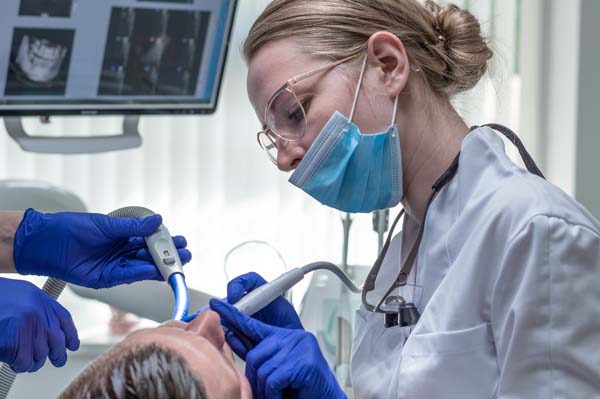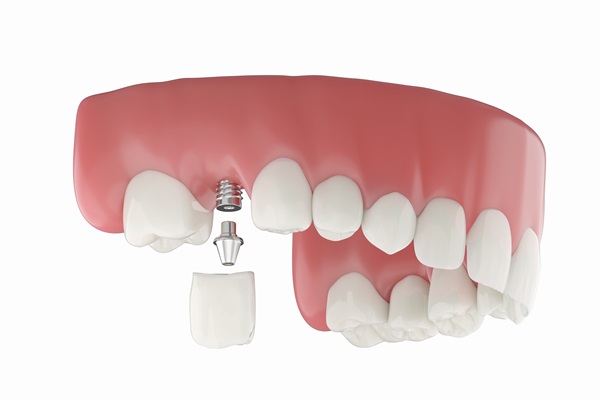The Different Types of Oral Surgery Procedures

At one point or another, anyone who has ever been to a dentist will have to undergo one or more oral surgery procedures to fix their oral health problems. Even though it might sound scary to a patient, it is something that dentist do very often, so there is no reason for concern.
Different types of oral surgery procedures
Some of the most common oral surgery procedures dentists perform include:
Tooth extraction
Tooth extraction is a very common dental surgery procedure. Extractions are performed to prevent the spread of decay and gum disease. This can be when a tooth is too damaged to be salvaged or when there is no room in the mouth for a tooth to erupt properly.
Visible teeth are extracted using forceps, but surgery is usually required if the tooth is stuck under the gums.
Dental implants
Dental implants are used to replace missing teeth. Unlike dentures, which sit on the top of the gums, implants are fused to the jaw bone. Then an artificial tooth is screwed to the top to restore the appearance of the patient’s teeth.
The implants, which act as tooth roots, also stimulate bone growth and help to preserve the patient’s facial structure.
Bone grafting
This is one of the most commonly used oral surgery procedures for people who want to get dental implants but do not have enough bone mass in their jaw to hold the implant in place. The procedure is used to take some bone from one part of the body and use it to increase the density of the bone in the jaw.
Apicoectomy
This procedure is performed if a root canal is not sufficient enough to stop the spread of the infection from the dead nerve inside a tooth. During the procedure, the dentist will remove the infected portion of the tooth roots. This is to get rid of the infection before filling the root to prevent future infections.
Corrective jaw surgery
Corrective jaw surgery, also known as orthognathic surgery, is used to correct conditions with the jaw and face. These include the misalignment of jaws and teeth. The surgery can be used to fix speaking and breathing problems as well as bite problems and sleep apnea.
Root amputation and dental hemisection
Root amputation refers to the surgical removal of one root if a tooth is multi-rooted. If one or more tooth roots become infected or there is significant bone loss around the tooth, then a dentist may refer their patient to an oral and maxillofacial surgeon for an oral surgery procedure known as hemisection. During the procedure, the surgeon will remove half of the tooth, leaving a serviceable, one-rooted tooth.
Crown lengthening procedures
Before a crown is placed on a tooth that is cracked, broken or has been weakened by decay, a dentist may refer their patient to an oral and maxillofacial surgeon for a crown lengthening procedure. This will ensure that the tooth’s structure will be able to securely hold the crown in place.
Conclusion
Oral surgery procedures are used to fix problems people have with their mouths, helping to ensure their optimal oral health. If you have oral health problems that might require surgery, schedule an appointment with a dentist to determine the best way to fix the problem.
Request an appointment here: https://www.drjstearns.com or call Platte Valley Oral Surgery at (303) 997-0220 for an appointment in our Denver office.
Check out what others are saying about our dental services on Yelp: Oral Surgery in Denver, CO.
Recent Posts
Wisdom teeth extraction may be necessary to achieve better dental health. Research shows that the third molars often emerge after all your teeth have erupted. Wisdom teeth may not be a problem at all. But in some cases, the dentist will recommend their removal. Here are the details on how a wisdom teeth extraction happens.This…
Single-tooth implants use dental implant technology to provide long-term and natural-looking solutions to tooth loss. Since losing only one tooth can impact oral health, function, and appearance, replacing the tooth must be a priority. Here is a closer look at the importance of individual tooth replacement and some compelling reasons to consider single-tooth implants.Having a…
Infections after dental procedures occur frequently and that is primarily due to a lack of education on how to avoid it, however, with the help of an oral surgeon, infections can be avoided in a few ways. Oral surgeons are dental professionals who focus on invasive procedures that are necessary in order to treat or…
Clinical studies show that the dental implant remains the gold standard of dental restorations. Implants can help bring back your smile and dental function. The right dental professional can perform the procedure without any issues. Here are the details on how an oral surgeon approaches a dental implant surgery.Choosing a dentist who has training and…


